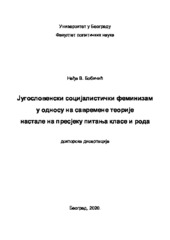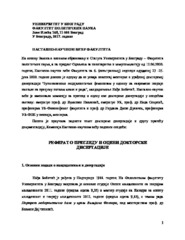Приказ основних података о дисертацији
Југословенски социјалистички феминизам у односу на савремене теорије настале у пресјеку питања класе и рода
Yugoslav socialist feminism in relation to contemporary theories that emerged at the intersection of gender and class issues
| dc.contributor.advisor | Duhaček, Gordana Daša | |
| dc.contributor.other | Pavlović, Vukašin | |
| dc.contributor.other | Sekulić, Nada | |
| dc.creator | Bobičić, Nađa | |
| dc.date.accessioned | 2020-11-16T15:12:44Z | |
| dc.date.available | 2020-11-16T15:12:44Z | |
| dc.date.issued | 2020-09-30 | |
| dc.identifier.uri | http://eteze.bg.ac.rs/application/showtheses?thesesId=7745 | |
| dc.identifier.uri | https://fedorabg.bg.ac.rs/fedora/get/o:22974/bdef:Content/download | |
| dc.identifier.uri | http://vbs.rs/scripts/cobiss?command=DISPLAY&base=70036&RID=23676169 | |
| dc.identifier.uri | https://nardus.mpn.gov.rs/handle/123456789/17653 | |
| dc.description.abstract | Развој југословенског социјалистичког феминизма, у периоду од 1975. до 1990, из угла савремених теорија насталих на пресјеку анализа рода и класе, тема је ове докторске дисертације. Како би се одредило мјесто југословенског социјалистичког феминизма у љевичарској феминистичкој историји, прати се историја динамичног осноса покретâ за женску и радничку еманципацију од краја деветнаестог вијека, преко љевичарских феминистичких струја тзв. другог таласа, до савремених тенденција. Упоредном методом, интерпретирају се опуси Виде Томшич, Блаженке Деспот и Наде Лер-Софронић, према три критеријума: како ове ауторке реинтерпретирају класике марксизма; како објашњавају однос појмова класе и рода; и какав став имају према тзв. женском питању у оквиру радничког покрета, односно према феминистичким организацијама. На основу тога, у раду се препознају два оригинална југословенска љевичарска феминистичка приступа: самоуправни приступ женском питању, који настаје у традицији класичног марксизма, повезујући је са теоријом самоуправљања, и југословенски социјалистички феминизам, који критички приступа класичном канону, те премрежава и надграђује друготаласне лијеве приступе са теоријом и праксом самоуправљања. Проучавање овог корпуса текстова не задржава се само на интерпретацији прошлости, већ поставља питања од кључног значаја и за савремени тренутак, која се тичу могућности савезништва између феминизма и марксизма, као и других прогресивних покрета. Такође, успоставља се, током деведесетих година прошлог и прве деценије овог вијека накратко прекинут, континуитет са љевичарском феминистичком традицијом у регионалним оквирима, чиме се интервенише у поље југословенске историје теоријске мисли и феминизма и марксизма | sr |
| dc.description.abstract | The subject of this PhD thesis is the development of Yugoslav socialist feminism between 1975 and 1990, from the point of view of contemporary theories that emerged at the intersection of gender and class analysis. In order to delineate the position of Yugoslav socialist feminism in the history of leftist feminisms, we trace the dynamic relationship of women's and workers' liberation movements from the end of the 19th century, via so-called second-wave leftist feminist currents, to the modern tendencies. In particular, the thesis provides a comparative interpretation of the works by Vida Tomšič, Blaženka Despot and Nada Ler-Sofronić, according to these three criteria: how do these authors reinterpret the classics of Marxism; how do they explain the relationship of the concepts of class and gender; and what was their opinion on the so-called women's question within the workers' movement, that is, on feminist organizations. Based on this, we identify two original Yugoslav leftist approaches to feminism: the socialist self-management approach to the women's question, which emerged from the tradition of classical Marxism, linking it with the Yugoslav self-management theory, and the Yugoslav socialist feminism, which critically approaches the classical cannon, intersects and develops further on the second-wave leftist approaches in relation to the theory and practice of socialist self-management. In addition, the study of this corpus goes beyond mere interpretation of the past. It also addresses important questions for the present moment, regarding the possibilities of forging alliances between feminism and Marxism, as well as the other progressive movements. By doing so, we aim at re-establishing a continuity with the leftist feminist tradition in the region, a contiuity that was briefly interrupted during the 1990s and 2000s, and thus, at intervening into the history of Yugoslav thought on feminism and Marxism alike | en |
| dc.format | application/pdf | |
| dc.language | sr | |
| dc.publisher | Универзитет у Београду, Факултет политичких наука | sr |
| dc.relation | info:eu-repo/grantAgreement/MESTD/Integrated and Interdisciplinary Research (IIR or III)/47021/RS// | |
| dc.rights | openAccess | en |
| dc.rights.uri | https://creativecommons.org/licenses/by-nc-nd/4.0/ | |
| dc.source | Универзитет у Београду | sr |
| dc.subject | југословенски социјалистички феминизам | sr |
| dc.subject | Yugoslav socialist feminism | en |
| dc.subject | женско питање | sr |
| dc.subject | феминизам | sr |
| dc.subject | класични марксизам | sr |
| dc.subject | самоуправљање | sr |
| dc.subject | СФРЈ | sr |
| dc.subject | историја феминизма | sr |
| dc.subject | the womens question | en |
| dc.subject | feminism | en |
| dc.subject | classical Marxism | en |
| dc.subject | socialist self-management | en |
| dc.subject | SFR Yugoslavia | en |
| dc.subject | history of feminism | en |
| dc.title | Југословенски социјалистички феминизам у односу на савремене теорије настале у пресјеку питања класе и рода | sr |
| dc.title.alternative | Yugoslav socialist feminism in relation to contemporary theories that emerged at the intersection of gender and class issues | en |
| dc.type | doctoralThesis | en |
| dc.rights.license | BY-NC-ND | |
| dcterms.abstract | Духачек, Гордана Даша; Секулић, Нада; Павловић, Вукашин; Бобичић, Нађа; Jugoslovenski socijalistički feminizam u odnosu na savremene teorije nastale u presjeku pitanja klase i roda; | |
| dc.identifier.fulltext | https://nardus.mpn.gov.rs/bitstream/id/66959/IzvestajKomisije23462.pdf | |
| dc.identifier.fulltext | https://nardus.mpn.gov.rs/bitstream/id/66958/Disertacija.pdf | |
| dc.identifier.rcub | https://hdl.handle.net/21.15107/rcub_nardus_17653 |



